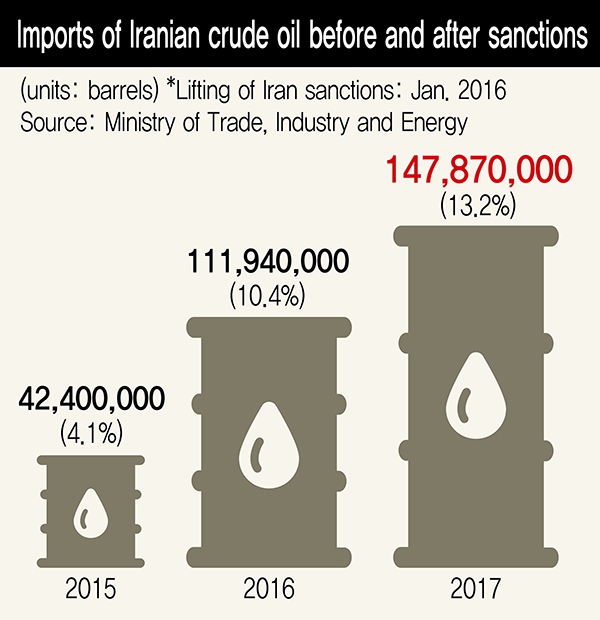 |
|
Imports of Iranian crude oil before and after sanctions (units: barrels)
|
South Korean government taken aback and tries to negotiate waiver
The South Korean government said it “had not expected” the US’s demand for its allies to stop importing Iranian crude oil without exception. The US’s abrupt demand caught Seoul off guard since it had been negotiating with the US for a waiver that would enable it to keep buying Iranian oil even if sanctions on Iran were reinstated. “We have yet to receive a request from the US to completely halt imports. We’ll keep negotiating with the US to receive a waver from the sanctions on crude oil imports,” said a senior official from South Korea’s Ministry of Trade, Industry and Energy on June 27. The US officially asked Japan to suspend imports of Iranian crude oil during a meeting of bureau chiefs on June 19. Since South Korea did not receive an official request, unlike Japan, Seoul had been acting on the assumption that it would be possible to arrange a waiver with the US. Shortly after the US unilaterally withdrew from its nuclear deal with Iran on May 8, Seoul set up a task force under South Korean Vice Minister of Trade Lee In-ho to deal with problems related to oil supply and demand and Iranian imports and exports. The task force has been discussing countermeasures with oil refineries and other companies in the private sector and laying the groundwork for negotiations about a waiver by conveying the South Korean position to the US. Even before the sanctions on imports of Iranian oil were lifted in Jan. 2016, South Korea had a waiver that allowed it to keep importing Iranian oil. But since the US had only given waivers to countries that reduced their imports, South Korea had cut its imports from 87.2 million barrels in 2011 to 42.4 million barrels in 2015. Even after withdrawing from the Iran nuclear deal last month, the US had informed its allies that it would decide whether to grant waivers based on their willingness to reduce imports. But now it has suddenly shifted to a more hardline stance, demanding that they cut imports unconditionally. This has blindsided South Korea’s oil refining sector, which was counting on Seoul’s negotiators to pull through with a waiver for oil imports. Five South Korean companies are importing Iranian crude oil: Hyundai Oilbank, Hyundai Chemical, SK Incheon Petrochem, SK Energy and Hanwha Total Petrochemical. These companies’ imports have increased rapidly since sanctions were lifted, reaching 147.87 million barrels last year. “Since Iran does not account for a large share of total crude oil imports, at 13.2%, it will not be hard to find replacements,” oil refineries said. The implication is that there will not be trouble with oil supply and demand, at least for now. Even so, the petrochemical industry is sure to feel the pain of rising crude oil prices on the international market. Oil prices were roiled by the US government’s demand. On the New York crude futures market on June 26, US Western Texas Intermediate (WTI) closed the day at US$70.53 a barrel, up US$2.45 from the previous day. This was the first time in a month, since the end of May, when the price had topped US$70. The bigger problem is that the US may ask its allies to impose tougher sanctions without offering waivers not only in crude oil but in other areas, such as commodities and finance. According to the Korea International Trade Association (KITA), South Korea’s exports to Iran were worth US$4.02 billion last year, up 8.2 percent from the previous year. The main products being exported are automobiles, synthetic resins, steel plates, paper products, refrigerators and displays. South Korean home appliances made by companies such as Samsung Electronics and LG Electronics control more than 60 percent of the Iranian market. Some are concerned that if a ban is placed on dollar and euro transactions with Iran, exports could be cut off altogether. “We’re following the situation closely. We will ensure that any harm to the South Korean economy is minimized,” said a senior official at the Ministry of Trade, Industry and Energy. By Choi Ha-yan, staff reporter Please direct comments or questions to [english@hani.co.kr]






